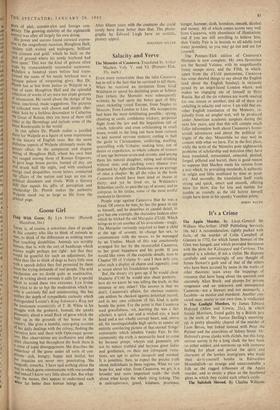Salacity and Verve
EVEN more remarkable than the tales Casanova has to tell is the fact that he survived to tell them. When he received an invitation from Graf Waldstein to spend his declining years at Schloss Dux (where the Memoirs were subsequently written), he had spent the better part of fifty years racketing round Europe, from Naples to Moscow, from London to Linz. His occupations had been the most debilitating possible : spying, cheating at cards, confidence trickery, perpetual flight from the law and the Inquisition (all of which, tolerable and even exhilarating in small doses, would in the long run have been ruinous to any normal nervous system); rotting in half the gaols in Christendom; soldiering, duelling, quarrelling with Voltaire; making love, out of desire or expedience. to whole cohorts of women of any age between seven and seventy, and among them his natural daughter; eating and drinking without stint; and catching every disease ever dispensed by Aphrodite Pandemos on an average of once a chapter. By all the rules in the book Casanova should have been dead or insane at thirty; and yet he lived on, in Waldstein's Bohemian castle, to pass the age of seventy and to compose, in his sixties, some of the most zestful memoirs in literature.
People urge against Casanova that he was • a fraud. Of course he was;„ he has the grace to say so himself, and he describes in candid detail, to give but one example, the shameless fashion after which he tricked the old Marquise d'Urfe. Which brings us to yet another of his avocations—magic. The Marquise variously required to bear a child at the age of seventy, to change her sex, to communicate with the moon. to be massaged by an Undine. Much of this was courteously arranged for her by the resourceful Casanova, to her great happiness and his profit. If you would •like some of the exquisite details, turn to Chapter III of Volume V—and I then defy you, after such a display of charm and ingenuity, ever to moan about his fraudulence again.
But, the dreary cry goes up, if he would cheat Madame &Ude he would also cheat posterity : how do we know he was telling the truth, in this instance or any other? The answer is that we don't. Casanova's affairs, for obvious reasons, can seldom be checked against historical record; and in any case criticism of this kind is quite beside the point. For the point is that Casanova used gracefulness, wit, learning (he was a fair scholar), a quick ear and a wicked eye, a hard head and a not wholly corrupt heart, and, above all, his inextinguishable high spirits to render an entirely convincing picture of that eternal 'fringe' community which inhabits Vanity Fair. In this community the truth is necessarily hard to come by because pimps, whores and gamesters are not by nature truthful and because great ladies and gentlemen, on their not infrequent visita- tions, are apt to arrive incogniti and masked. It is pointless, then, to expect the precise truth about individuals in these regions. What w e can hope for, and what, from Casanova, we get, is a broader and more important truth—the truth about what keeps the whole thing ticking. This is concupiscence, greed, kindness, prurience,
hunger, humour, sloth, boredom, conceit, alcohol and money. All of which comes across very well from Casanova, with abundance of illustration; and if you are still unwilling to believe him, then Vanity Fair is in bounds to all adults (and many juveniles), so you may go out and see for yourstlf.
The Putnam /Elek edition of Casanova's Memoirs is now complete. My own favourites are the Second Volume, with its magnificently funny escape story, and the Fifth, in which, apart from the d'Urfd pantomime, Casanova has some shrewd things to say about the English (and about the English Sunday), is viciously poxed by an angel-faced London whore, and makes an engaging ass of himself in Holy Russia. But all the six volumes are worth reading for one reason or another, and all of them arc unfailing in salacity and verve. I am told that an- other English translation of the Memoirs, re- putedly from an ampler text, will be produced under American academic auspices during the next few years, and that this will contain much fuller information both about Casanova's homo- sexual adventures and about the political in- trigue of the day. Meanwhile we may well be content with what we have. For in the first place, while the texts of the Memoirs pose nightmarish problems of scholarship and detection (they have been translated, retranslated, censored, pirated, forged, pilfered and burnt), there is good reason to suppose that Machen made his version from a text which, by prevailing standards, is authentic in origin and little mutilated by time or prud- ery. And secondly, the translation itself reads strong and quick, smart and smooth, offering blow for blow, kiss for kiss and tumble for tumble as roundly as the old horror himself might have done in his spunky Venetian prime.
SIMON RAVEN


































 Previous page
Previous page